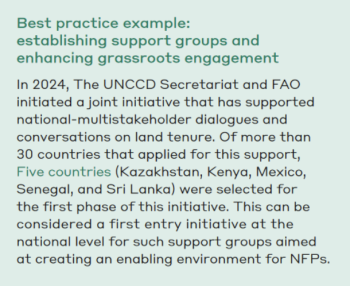Key findings and recommendations:
Our findings reveal significant challenges faced by governments in systematically implementing tenure decisions and recognising legitimate tenure rights within Land Degradation Neutrality (LDN) priority areas.
These challenges are particularly pronounced in contexts with limited resources, competing land uses, or weak governance structures. However, recognition alone is insufficient. Governments must establish robust and practical frameworks to secure these rights while ensuring that tenure systems are inclusive.
As our fieldwork in the six countries, led by strong Civil Society Organisations (CSOs) at the national level, has demonstrated, addressing these issues requires collaborative efforts. CSOs play a critical role in bridging the gap between governments and communities by advocating for policy reforms, enhancing accountability, and facilitating meaningful local participation.
Recommendations:
1.Prioritize collaborative resource management as a pathway to achieve LDN;
- Strengthen collaborative frameworks to embed community involvement
- Invest in inclusive land use planning to empower communities and prevent conflicts
2.Strengthen access to justice and conflict resolution mechanisms
- Establish inclusive and accessible grievance mechanisms
- Partner with civil society organisations for community-led justice

3.Creating an enabling environment for National Focal Points
- Establish dedicated support groups and foster collaborative networks for NFPs

- Enhance grassroots engagement for inclusive implementation
| Year of publication | |
| Geographic coverage | BeninKenyaMadagascarMalawiNigerUganda |
| Originally published | 06 Dec 2024 |
| Related organisation(s) | ThinkTankforSustainability (TMG) |
| Knowledge service | Metadata | Global Food and Nutrition Security | Sustainable Food Systems | Gender mainstreamingLand degradationLand tenure |
| Digital Europa Thesaurus (DET) | policymakingMonitoringdroughtland usedesertification |
